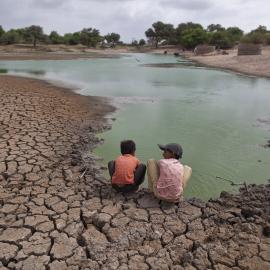Michael Ross ("Blood Barrels," May/June 2008) argues that oil triggers conflict in three main ways: fluctuating oil prices lead to economic instability, which is followed by political instability; oil wealth supports insurgencies; and oil wealth encourages separatism. These factors are important, but Ross is too selective. Embedding them in a broader framework would be more illuminating and would better inform policy.
The essence of the problem can be summed up in one word: fragmentation. In many resource-rich countries, politics involves vertical relationships of dependence based on the central source of wealth, and factions compete (or fight) for their share in a grand zero-sum game. This behavior is highly divisive, politically and socially; it reinforces existing fractures, such as ethnic, religious, or regional rivalries, and generates new schisms. As resources flow (or trickle) downward, politics splinters at all levels, from the high echelons of power to the village and even the family level. Other sources of economic rents and aid can have similar effects.
Contrast this with a country such as Denmark or the United States, where wealth is widely distributed, leading citizens to cooperate through trade and in markets and form horizontal relationships that compensate for natural fragmentation. In such countries, governments tax citizens directly, which provides an institution-building stimulus and creates the "no taxation without representation" political bargain that helps build accountability and consensus -- and further counteracts fragmentation. In oil nations, where rulers mostly tax oil companies and can ignore their citizens, no such repairing happens.
Civil war is an obvious result of the fracturing effect of oil, but it is not the only one. Corruption, which involves the promotion of personal or factional interests at the expense of the wider or national interest, is another. Oil-fueled fragmentation, by reinforcing narrow interests and weakening broader ones, is at the heart of the bad governance prevalent in oil states. The degeneration of a nation such as Nigeria into widespread corruption is analogous to the collapse of a well-ordered queue and the ensuing scramble of people trying to get to the front -- the participants have lost faith in one another and in the system. Since this breakdown of social trust is systemic, neither enlightened leadership nor law enforcement measures can solve it.
Rulers in oil-dependent states seek to repair the fissures either by carefully deploying resource-based patronage (buying off restive factions by allocating goods to them) or by exercising greater authoritarianism, which is relatively easy as oil wealth funds their instruments of repression. Oil, poured over Iraq's existing political divisions, helped make Saddam Hussein so brutal. Thus, in oil-dependent nations, conflict, corruption, authoritarianism, and the poverty that results are best understood within an overarching framework of fragmentation and lost social trust.
Systemic approaches and ones that address the tax problem directly -- such as the proposal to distribute oil revenues directly to a country's citizens, which was advocated by Nancy Birdsall and Arvind Subramanian in these pages a few years ago ("Saving Iraq From Its Oil," July/August 2004) -- can be fruitful. The standard remedies, such as oil funds, economic diversification, transparency, and even the Chinese-style barter that Ross mentions, may help at the margins, but nowhere have they decisively reversed the oil curse.
The many objections raised against direct oil-wealth distribution are mistaken, except for one: it would be a tough thing to do. Direct distribution would be inappropriate or impossible for many countries and hard to implement in the places where it might be done. But reversing the effects of the oil curse in poor countries without direct distribution would be harder still. It is time for someone to assess how and where to try direct distribution in a developing country, then do it, and show it can work. It will then get easier to implement elsewhere -- and at last the turmoil, corruption, and brutality can be curbed.
You are reading a free article.
Subscribe to Foreign Affairs to get unlimited access.
- Paywall-free reading of new articles and a century of archives
- Unlock access to iOS/Android apps to save editions for offline reading
- Six issues a year in print, online, and audio editions
